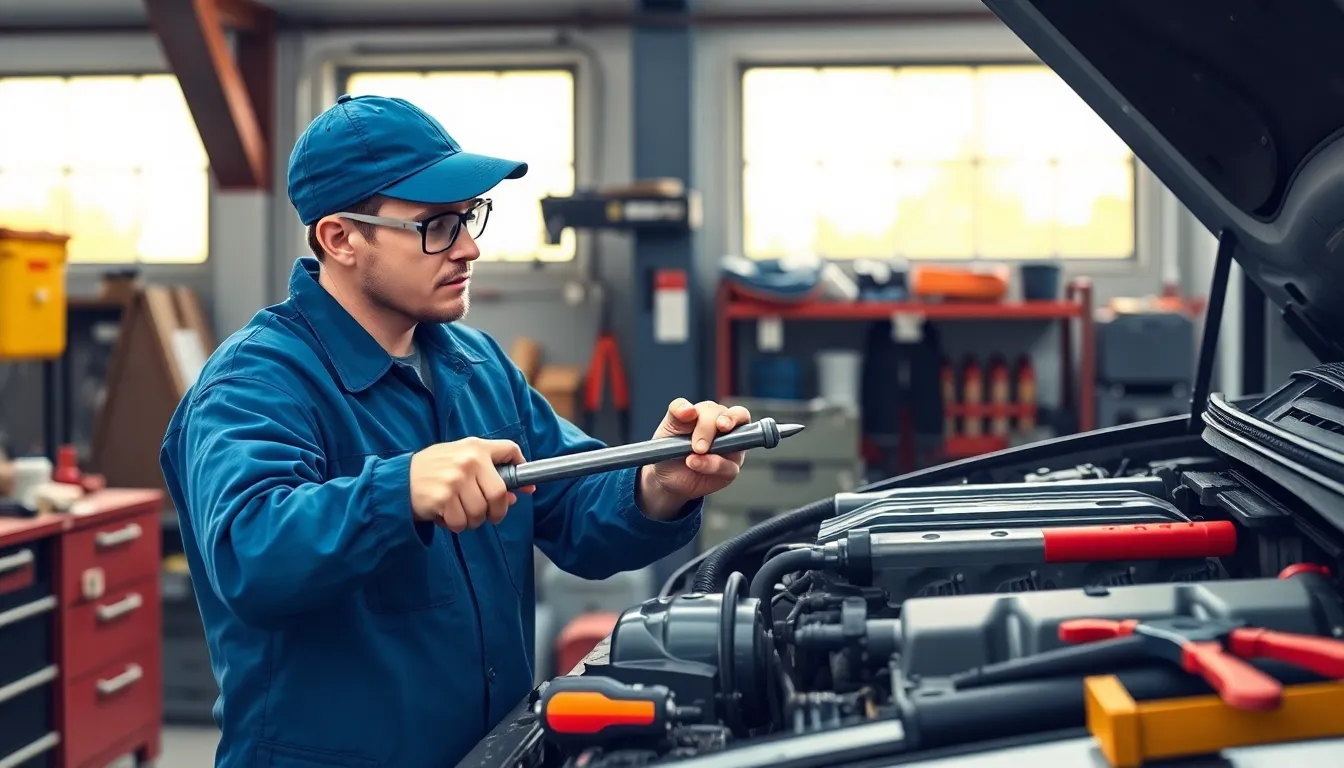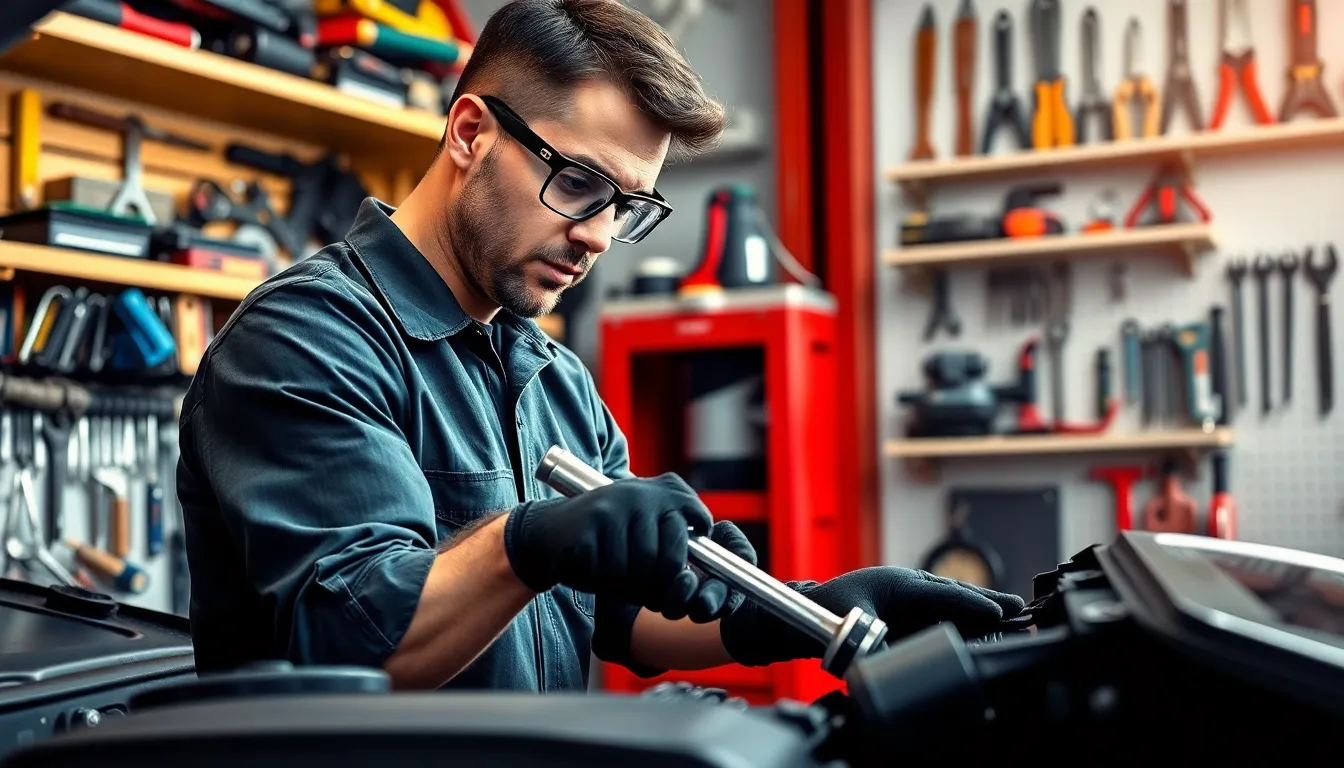Table of Contents
ToggleIn the world of mechanical workshops, tools aren’t just gadgets—they’re the unsung heroes that turn chaos into order. Whether it’s a trusty wrench or a high-tech torque driver, each tool has its own personality and purpose. Just like a well-cast ensemble in a blockbuster movie, these tools work together to create mechanical magic.
Overview of Mechanical Workshop Tools
Mechanical workshop tools serve as vital components in any workspace. These tools streamline tasks, enhance productivity, and ensure precision in mechanical operations. Categories of tools include hand tools and power tools, each fulfilling specific purposes.
Hand tools encompass manual instruments such as wrenches, screwdrivers, and pliers. These implements provide fundamental functions in tightening, loosening, or gripping components. As a result, they enable workers to perform basic repairs and adjustments effectively.
Power tools, in contrast, automate tasks and reduce physical effort. Examples include drills, grinders, and lathes. These machines expedite processes that would take significant time to complete manually. Consequently, they are beneficial for larger projects and intricate tasks requiring precision.
Specialty tools also play a crucial role in mechanical workshops. Items like torque wrenches ensure accurate measurements, while diagnostic tools, such as multimeters, assist in troubleshooting electrical issues. Each type of specialty tool addresses specific challenges, contributing to overall project efficiency.
Safety equipment forms another critical aspect of mechanical workshops. Items such as safety goggles, gloves, and ear protection safeguard personnel from hazards. Adhering to safety protocols enhances workplace security and promotes a culture of safety among workers.
The organization of tools contributes significantly to workspace efficiency. Toolboxes and storage solutions keep tools easily accessible and categorized. A well-organized area not only saves time but also minimizes frustration during tasks.
Ultimately, mechanical workshop tools encompass a wide array of instruments designed to facilitate various operations. Each tool plays a unique role in the effectiveness of mechanical tasks, ensuring that work is done accurately and efficiently.
Types of Mechanical Workshop Tools

Mechanical workshops rely on various tools categorized into hand tools, power tools, and automotive tools. Each category serves distinct purposes essential for effective operations.
Hand Tools
Hand tools include instruments like wrenches, screwdrivers, and pliers. These tools are fundamental for making repairs and adjustments in mechanical tasks. Craftsmen often prefer hand tools for their simplicity and precision. Socket sets allow for easier access to tight spaces. Needle-nose pliers excel in gripping small objects. Basic hand tools are crucial for everyday maintenance and repairs.
Power Tools
Power tools, like drills and grinders, automate tasks, leading to increased efficiency. Advanced models often feature variable speed settings and safety mechanisms. Electric drills make quick work of drilling holes, while angle grinders cut through various materials with ease. Notably, corded and cordless options provide flexibility for different environments. Users appreciate the precision that power tools brings to larger projects.
Automotive Tools
Automotive tools focus specifically on vehicle maintenance and repair. Essential tools include torque wrenches, compression testers, and scan tools. Torque wrenches ensure proper fastening of components, while compression testers assess engine health. Diagnostic scan tools simplify problem detection by interfacing with vehicle systems. Each tool enhances the ability to troubleshoot and repair vehicles efficiently, ensuring optimal performance and safety.
Essential Mechanical Workshop Tools
Mechanical workshop tools play a critical role in ensuring efficient operations. Various instruments enhance productivity and effectiveness in a workshop setting.
Toolboxes and Organizers
Toolboxes and organizers keep workspaces tidy and efficient. Portable toolboxes allow easy transport of essential instruments and prevent loss. Wall-mounted organizers maximize space by providing easy access to frequently used items. Drawer-style organizers keep smaller tools sorted and in one location, making it simple to find what’s needed quickly. Some professionals prefer modular storage systems, which let them customize their setups based on specific projects and tool selections. A well-organized toolbox saves time and reduces frustration during tasks.
Measurement Tools
Measurement tools form the backbone of precise work. Dial calipers provide accurate dimensions, ideal for intricate tasks. Tape measures ensure dimensions are adhered to during construction or adjustments. Laser distance measurers offer quick, accurate readings over longer distances without requiring physical contact. Micrometers deliver precision measurements for small parts, enhancing quality control. Using these tools ensures every project meets the required specifications, improving overall quality and fit.
Safety Measures in Using Workshop Tools
Ensuring safety in a mechanical workshop protects personnel and enhances productivity.
Personal Protective Equipment
Selecting appropriate personal protective equipment (PPE) is crucial. Goggles shield eyes from debris, while gloves protect hands from cuts. Ear protection minimizes noise exposure, which can lead to hearing loss over time. Wearing durable work boots offers ankle support and guards against heavy tool drops. Face shields provide additional safety during grinding tasks, preventing facial injuries. Overall, ensuring each team member uses effective PPE creates a safer working environment.
Safe Tool Handling Practices
Practicing safe tool handling contributes significantly to workplace safety. Keeping tools in good condition prevents accidents and allows for efficient operation. Always securing loose clothing and long hair helps avoid entanglement. Using tools for their intended purpose minimizes risks associated with misuse. Carrying tools in designated containers reduces chances of dropping them. Regularly inspecting tools before use identifies potential hazards, ensuring a secure workspace. Prioritizing these practices creates a culture of safety in mechanical workshops.
Mechanical workshop tools are indispensable for achieving efficiency and precision in various tasks. Each tool plays a vital role in enhancing productivity and ensuring quality outcomes. By prioritizing organization and safety, workshops can create an environment that not only fosters creativity but also promotes effective work practices.
Investing in the right tools and storage solutions can significantly streamline operations. Emphasizing safety measures and proper tool handling further contributes to a culture of responsibility and care. Ultimately, a well-equipped and organized workshop empowers craftsmen to tackle projects with confidence and skill.





